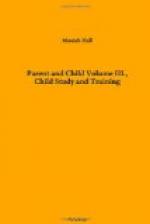LESSON X
QUESTIONS FOR DISCUSSION
1. Discuss fully each of the maxims given by Professor James, illustrating by experiences you have known.
2. What expression from Professor James is most impressive to you?
3. What hope is there for those enslaved by a bad habit? How can we best help them?
4. What was Christ’s way of dealing with such people?
5. What are the common habits that most trouble us? How can they be best prevented or overcome?
HABITS OF INFANCY AND CHILDHOOD
The First Physical Habits Acquired by the Child Are of Vast Importance and Require Heroic Treatment on the Part of the Mother
From the beginning both physical and mental habits will be acquired by the child. At first, attention must be given chiefly to the regularity of caring for the physical needs of the infant such as giving food at stated intervals, and having a regular time for sleeping, bathing, and for being dressed. It is astonishing how little trouble is caused by the infant when it is trained in correct physical habits from the beginning, compared with the babe that is treated in a spasmodic fashion—everything overdone sometimes and nothing at all done at other times. In the former case the little one is quiet and peaceful and sleeps, as it should, most of the time, especially at night; in the latter case the child is fretful and cross and requires the father to trudge it about at night much to his discomfort and loss of temper.
Nature has given the infant a voice which is not only lusty but which is apt to be used from the first with unnecessary liberality. It is the little one’s only means of responding to stimuli that cause discomfort; at first the infant’s cry is reflex and unconscious; but if every time it cries something happens, a sort of dim consciousness is soon awakened and the habit of crying for nothing or on the slightest provocation is soon established, and thereafter the child will rule the household like a Czar. If, on the other hand, the mother understands that the crying reflex is largely unnecessary at the present time, since she has learned to administer to the infant’s every requirement with clock-like regularity, she will, when assured that nothing ails the child, let it cry if it wants to without giving it the least attention. One can scarcely believe how soon the crying reflex will disappear under such treatment. If, on the other hand, the child is taken up whenever it cries and walked and rocked and fondled, it quickly learns that individuals were made solely to wait on it, and the great instinct of selfishness is aroused which is likely to carry in its wake a world of trouble and disappointment. Who has not heard a crying child in an adjoining room stop suddenly to listen for the sake of discovering whether or not the noises he heard are the regular movements of a person coming to him or merely the irregular noises of the wind or of moving furniture which do not concern him? Not only is the child plastic, but too often a portion of the environment is also plastic and yielding and usually to the lasting detriment of the child. The young mother who would train her child to right habits must be heroic.




